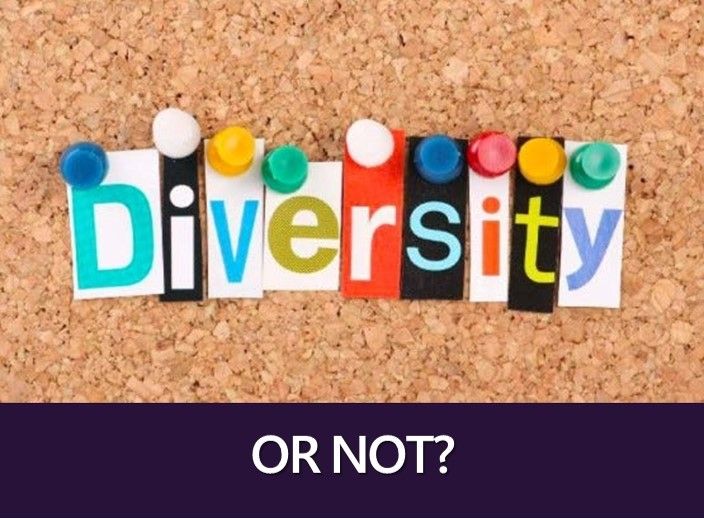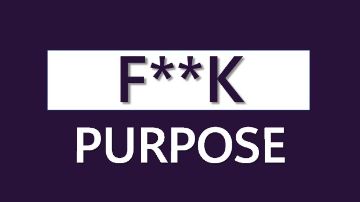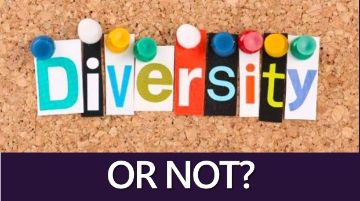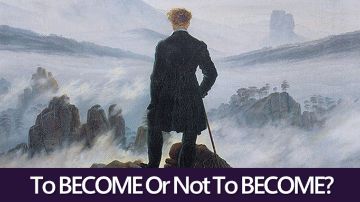
“Diversity” has become a staple. Undoubtedly, this is positive. However, diversity discourses have a tendency to shift from diversity as a descriptive concept to diversity as a moral norm — and when a “dogma of diversity” starts to crowd out critical voices as “illegitimate” we must dig a little deeper.

I am involved in many conversations — especially with HR — where questions about “diversity” have become a staple. Undoubtedly, this is positive — I still remember times when nobody took notice.
However, diversity discourses have a tendency to shift from questions of analysis to judgments about quality or impositions of quotas. Here, we should pause. There is a big difference between diversity as a descriptive concept vs diversity as a moral norm — and when a “dogma of diversity” starts to crowd out critical voices as “illegitimate”, or its proponents commence to pursue allegedly “non-diverse” entities like the Spanish inquisition we must dig a little deeper. As critical thinkers and leaders we must always stay vigilant and curious about the hegemony of certain management discourses — seeking to understand why they dominate and where the boundaries of their usefulness might lie.
Firstly, on the positive side. Our diversity discussions stem from the overdue acknowledgement that a narrow-minded stereotype of personhood has prevailed far too often in our societies and institutional frameworks — against which we have judged and towards which we have enculturated people. Hence, the removal of biases and actual hurdles (be they physical or mental) — in the form of programmes that seek to acknowledge, recognise and integrate specific minorities — is highly desirable. This is especially true when it comes to access and admission processes — as a society we must ensure equity, not equality, of access. This also implies that increasingly we should recognise that EVERY person is different – diversity is already there – and any categorisation into convenient groupings can only be a distorted device.
Secondly, on the not so positive side. I believe we must be very careful not to reify diversity — for several reasons:
- Efficiency: Based on much research, in an organisational context more diversity does not necessarily imply higher performance. Firstly, diversity expressed in popular categorisations (e.g. gender, age, colour, tenure, sector, nationality, disabilities etc) might not necessarily imply difference of thought. In my experience, in business and politics the allegedly most “diverse” people often come from exactly the same schools, neighbourhoods and career paths. And they often reason in precisely the same way. Secondly, diversity and performance are not linearly correlated. What we can see is that the spread of performance widens — with increasing “outliers” on both the high and low end of the spectrum. And that is unsurprising — more diversity can lead to more conflict, ambiguity and necessity to build bridges. That often naturally leads to an initial reduction of performance and whether “diversity pays” in the long run will strongly depend on the investment in community building and (necessarily higher) quality of leadership.
- Ethics: But that is not my worry — my main concern is ethical. The notion of “diversity” is, above all, descriptive. It acknowledges differences in the composition of communities or societies or individuals, by introducing — often arbitrary — categories of analysis. Nothing about the concept of diversity is normative — it simply is not intrinsically “good or bad”, or right or wrong, to be more or less diverse. This is where people seem to unduly jump from a question of “access” to a certain role or office — which certainly should be attainable by all, based on appropriate criteria and independent of the applicants’ makeup or origins — to a question of “merit”. This relates to a “corrective” understanding of justice where the claim is made that for a certain office or population criteria of competence and merit must be (partially) displaced by a calculus of distribution — often in relation to historical “underrepresentation”. Whether the suggested “split” of purported categories is “reflective of the makeup of the population”, an arbitrary “balance”, or minimum quotas — the foundational suggestion is that for a given problem the solution must be resolved taking into due account a certain “mix” of suggested externally discernable characteristics. Unsurprisingly, such claims are often advanced from a highly individualistic position — purporting the political interests of the category of people desiring increased representation, with much bravado and populist righteousness. And this is when I believe diversity becomes dumb…
Moreover, if we create D&I programmes we should recognise that our categories are always arbitrary — beyond the removal of specific barriers we should remind ourselves that EVERY person is unique and requires “personalised” support to develop their personal excellence .
In a nutshell, when it comes to ACCESS I certainly do believe diversity is extremely important: we must absolutely ensure nobody is disadvantaged in applying for an office or role because of their heritage or origin. It is a disgrace when people are discriminated by immature societies based on such externalities. Here, we need to do much more, not only in revising corporate selection processes, but by enabling the substantive equity of every children born into our rich societies. As Amartya Sen argued, freedom is our freedom to develop — distributive justice means that we enable every person to actualise their potential. When it comes to questions of EFFECTIVENESS in organisations, we should be careful not to reify diversity and implicitly elevate it above inclusion — in my experience, it is not the former, but the latter that creates the more important headaches. By the same token, we need to ensure questions of equity are not crowded out by diktats of equality: there is nothing more inequal than the equal treatment of inequals. Finally, when it comes to SELECTION for office, or the makeup of governance bodies, we need to separate distributive from contributive justice, and ensure both are appropriately balanced.
We certainly should – not must! – look for more diversity (of thought!) to ensure appropriate perspective-taking and effectiveness in decision-making processes, but we must – not should! - at the same time safeguard norms of merit and contribution when it comes to the standards for participation. What matters most is wisdom and competence of participants, not arbitrary and often ideological criteria of choice.
I am involved in many conversations — especially with HR — where questions about “diversity” have become a staple. Undoubtedly, this is positive — I still remember times when nobody took notice.
However, diversity discourses have a tendency to shift from questions of analysis to judgments about quality or impositions of quotas. Here, we should pause. There is a big difference between diversity as a descriptive concept vs diversity as a moral norm — and when a “dogma of diversity” starts to crowd out critical voices as “illegitimate”, or its proponents commence to pursue allegedly “non-diverse” entities like the Spanish inquisition we must dig a little deeper. As critical thinkers and leaders we must always stay vigilant and curious about the hegemony of certain management discourses — seeking to understand why they dominate and where the boundaries of their usefulness might lie.
Firstly, on the positive side. Our diversity discussions stem from the overdue acknowledgement that a narrow-minded stereotype of personhood has prevailed far too often in our societies and institutional frameworks — against which we have judged and towards which we have enculturated people. Hence, the removal of biases and actual hurdles (be they physical or mental) — in the form of programmes that seek to acknowledge, recognise and integrate specific minorities — is highly desirable. This is especially true when it comes to access and admission processes — as a society we must ensure equity, not equality, of access. This also implies that increasingly we should recognise that EVERY person is different – diversity is already there – and any categorisation into convenient groupings can only be a distorted device.
Secondly, on the not so positive side. I believe we must be very careful not to reify diversity — for several reasons:
- Efficiency: Based on much research, in an organisational context more diversity does not necessarily imply higher performance. Firstly, diversity expressed in popular categorisations (e.g. gender, age, colour, tenure, sector, nationality, disabilities etc) might not necessarily imply difference of thought. In my experience, in business and politics the allegedly most “diverse” people often come from exactly the same schools, neighbourhoods and career paths. And they often reason in precisely the same way. Secondly, diversity and performance are not linearly correlated. What we can see is that the spread of performance widens — with increasing “outliers” on both the high and low end of the spectrum. And that is unsurprising — more diversity can lead to more conflict, ambiguity and necessity to build bridges. That often naturally leads to an initial reduction of performance and whether “diversity pays” in the long run will strongly depend on the investment in community building and (necessarily higher) quality of leadership.
- Ethics: But that is not my worry — my main concern is ethical. The notion of “diversity” is, above all, descriptive. It acknowledges differences in the composition of communities or societies or individuals, by introducing — often arbitrary — categories of analysis. Nothing about the concept of diversity is normative — it simply is not intrinsically “good or bad”, or right or wrong, to be more or less diverse. This is where people seem to unduly jump from a question of “access” to a certain role or office — which certainly should be attainable by all, based on appropriate criteria and independent of the applicants’ makeup or origins — to a question of “merit”. This relates to a “corrective” understanding of justice where the claim is made that for a certain office or population criteria of competence and merit must be (partially) displaced by a calculus of distribution — often in relation to historical “underrepresentation”. Whether the suggested “split” of purported categories is “reflective of the makeup of the population”, an arbitrary “balance”, or minimum quotas — the foundational suggestion is that for a given problem the solution must be resolved taking into due account a certain “mix” of suggested externally discernable characteristics. Unsurprisingly, such claims are often advanced from a highly individualistic position — purporting the political interests of the category of people desiring increased representation, with much bravado and populist righteousness. And this is when I believe diversity becomes dumb…
Moreover, if we create D&I programmes we should recognise that our categories are always arbitrary — beyond the removal of specific barriers we should remind ourselves that EVERY person is unique and requires “personalised” support to develop their personal excellence .
In a nutshell, when it comes to ACCESS I certainly do believe diversity is extremely important: we must absolutely ensure nobody is disadvantaged in applying for an office or role because of their heritage or origin. It is a disgrace when people are discriminated by immature societies based on such externalities. Here, we need to do much more, not only in revising corporate selection processes, but by enabling the substantive equity of every children born into our rich societies. As Amartya Sen argued, freedom is our freedom to develop — distributive justice means that we enable every person to actualise their potential. When it comes to questions of EFFECTIVENESS in organisations, we should be careful not to reify diversity and implicitly elevate it above inclusion — in my experience, it is not the former, but the latter that creates the more important headaches. By the same token, we need to ensure questions of equity are not crowded out by diktats of equality: there is nothing more inequal than the equal treatment of inequals. Finally, when it comes to SELECTION for office, or the makeup of governance bodies, we need to separate distributive from contributive justice, and ensure both are appropriately balanced.
We certainly should – not must! – look for more diversity (of thought!) to ensure appropriate perspective-taking and effectiveness in decision-making processes, but we must – not should! - at the same time safeguard norms of merit and contribution when it comes to the standards for participation. What matters most is wisdom and competence of participants, not arbitrary and often ideological criteria of choice.
Popular articles in the KnowledgeHub: Good Society





 .
.